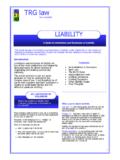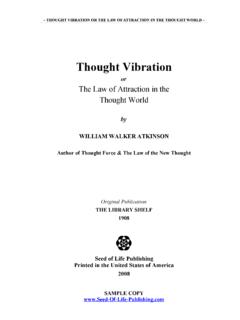Transcription of TRG law
1 1 What a waste of time (and money)! Businesses across the world spend an incredible amount of time and therefore money trying to get Confidentiality or Non-Disclosure Agreements (NDAs) in place with their numerous prospective customers or suppliers before they can even start talking to them about buying or selling their products or services. As I was reviewing yet another NDA, I thought that there must be a simpler and better way of addressing the issue of establishing the principle of confidentiality for disclosures made during the course of routine sales negotiations for products and services. Although I entirely accept that other transactions may very well justify an individually crafted NDA, in essence such agreements are all very similar indeed and should be relatively straightforward. Whilst some of the detailed wording of each NDA has historically been different, at heart they all: limit disclosure, generally on a need to know basis; restrict use to discussions and evaluation related to the prospective transaction which is under consideration; and oblige the parties to put in place a reasonable level of security to safeguard the information they have been given.
2 NON-DISCLOSURE AGREEMENTS Paul Golding proposes a new approach to NDAs with a simplified draft template Therefore it occurred to me, how much simpler and cheaper it would be if some sort of even-handed NDA could be developed which parties in negotiations could adopt to govern their discussions, without even having to sign anything and without having to have extended (or even any) discussions about choice of law and jurisdiction, indemnities for breach etc. No doubt, this approach will not appeal to everyone. After all, every company wants to make sure its agreements are watertight and drafted to its own individual satisfaction. But is the expenditure of time and effort on each and every occasion remotely worth it? Almost certainly not, particularly considering the sums involved. Given how rarely breaches of confidentiality occur in relation to sales related information (and query if most of the information is even really truly confidential at all?)
3 , surely it makes evident sense to use, so far as possible, a standard document which: has been tailored so as not to favour one party or the other; omits provisions which are inessential and which are likely to prove contentious; and achieves the essence of what both parties want from the document. TRG law law simplified A NEW APPROACH? 2 TRG law law simplified Such an approach would also avoid delay and enable the parties to get into discussions without having to first have negative/destructive arguments which could damage the goodwill that they are trying to foster before they have even got past first base. As with most contracts, the key thing here has to be trying to make yourselves as easy to do business with as possible whilst acting reasonably to protect your own interests. With that in mind, wouldn t it be great if the parties could simply agree in an exchange of e-mails, taking no more than a few minutes, that all discussions will be treated as being subject to an independently developed and widely trusted NDA?
4 I therefore started trying to develop just such a document. Taking a fairly standard NDA template, I checked that it covered the three essential elements described above. The document was then modified by taking out any part which was inessential and which was likely to prove contentious. Examples of the clauses that I omitted, and in some cases with more balanced wording as an alternative, are set out below: Choice of law and jurisdiction Whilst for most commercial contracts such choices are extremely important for reasons of certainty, in reality they are nearly always contentious in an international context as each party has their own preference. In other situations it is worth spending the time having the debate and reaching a definite choice but in this context I would suggest it is not. Most if not all jurisdictions recognise confidentiality as a fundamental concept and the basic laws of confidentiality are very broadly the same.
5 Therefore choice of law makes relatively little difference. In terms of jurisdiction, I would also argue this can be omitted. Very few NDAs end up the subject of court proceedings and where they do, the parties might very well welcome having the flexibility to bring proceedings in the most appropriate court depending upon the circumstances. Marking documents confidential Often there is a provision stating that disclosures only count as confidential if they are marked as such or, where disclosed orally, they are subsequently identified in writing as being confidential. These requirements to my mind ignore practical reality. Genuinely confidential information should not lose protection simply because it is not stamped as confidential on its face (although that is always a risk). Equally, identifying oral disclosures and confirming that the information is confidential would be a practical administrative nightmare and is likely to never be complied with when it comes down to it, with the result that genuine confidential information is again at risk if this is made a contractual obligation.
6 Deletion of copies There is frequently a requirement to delete all copies of confidential information held electronically. Let s face it, the time when confidential information was only handed over physically in hard copy form has long since passed. Most disclosures are now made electronically and then further internally distributed electronically by the recipient, often as e-mail attachments. That confidential information will then be reflected in many different versions of draft reports, e-mail discussions, draft contracts etc. It is simply quite impractical to expect all of those copies to be deleted. Locating each and every copy (including back-ups) would be almost impossible. Even were it to be achievable, the recipient would typically want to keep archive copies for risk/liability management purposes so that they could establish, if necessary, what had been disclosed and to whom and what use had been made of the information.
7 Much better to recognise practical reality and provide that where copies are retained, they are not used other than for record keeping purposes and that the information must remain to be treated as strictly confidential. NEW TYPE OF DOCUMENT 3 TRG law law simplified Indemnities for breach These are becoming more and more common and my view is that this is an unwelcome development. They have a superficial attraction for disclosing parties, particularly if they are, as is typical, entirely unlimited in terms of the scale of any liability. However, not surprisingly, they are incredibly contentious for recipients of information and query if they actually achieve what the disclosing party intends? Indemnities are entirely dependent upon their drafting in order to determine their scope. Usually they are drafted in extremely wide terms eg an indemnity in respect of all losses suffered as a result of a.
8 Those seeking the indemnity would presumably argue that it makes it much easier to establish a claim should that be necessary and avoids arguments about what types of losses can be claimed because of the all-inclusive wording. I am not sure that is true. Any claimant would still have to prove the scale and validity of any particular losses claimed and that they were suffered as a result of the breach. This is the case with or without the benefit of an indemnity. As you would expect, such indemnities are not favoured by information recipients. Again, it is feared that, depending upon the drafting, an indemnity may operate to expand the scope of potential liability which would exist at law anyway under a simple claim for damages. Such additional liability might not be covered by insurance depending upon the terms of any policy. Given these issues and the fact that any injured party still has the benefit of a claim for damages it there is a breach, I do not believe that the inclusion of an indemnity for general loss is worth the arguments that undoubtedly follow.
9 Guarantees of information security Absolute guarantees of information security (effectively, strict liability provisions) in the event of any unauthorised access can be considered by some as unduly onerous. NDAs generally fall into two discrete camps: some who seek to impose absolute security requirements and some who require that a party puts in place the same security measures that they do to protect their own equivalent information but at a minimum, exercising reasonable skill and care. The draft NDA template follows the latter option. Individual employees obligations Obligations to get individual employees to sign specific confidentiality obligations in favour of the disclosing party would be extremely problematic and burdensome from an administrative point of view. In reality it almost certainly would never happen and it is arguably unnecessary. Employees and others to whom confidential information can be disclosed are routinely subject to confidentiality obligations by virtue of their contract of employment or engagement terms.
10 Therefore I have proposed a more sensible and acceptable middle ground whereby any recipient must make sure that any employee or representative who receives confidential information must be subject to corresponding confidentiality obligations and the receiving party must take reasonable action to enforce the same where necessary. Accuracy of Information It is pretty typical for NDAs to expressly provide that the disclosing party gives no warranty whatsoever regarding the accuracy or completeness of the information disclosed. Whilst the basic rationale for this can be understood where the parties are simply in pre-contractual, preliminary discussions and where no money is changing hands, it has always struck me that this perhaps goes too far. The draft NDA template therefore includes some limited warranties to the effect that, so far as the disclosing party is aware, the information is not materially misleading.










